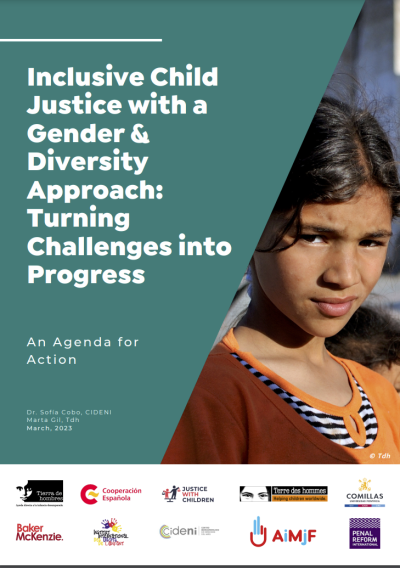Agenda for action: Inclusive Child Justice with a Gender & Diversity Approach: Turning Challenges into Progress
- Log in to post comments
This 'Agenda for Action' proposes progress in 5 specific challenges in order to collectively ensure targeted contributions to the 2030 Sustainable Development Goals (SDGs), namely SDG 5, which promotes gender equality, and SDG 16, which seeks to promote peaceful and inclusive societies for sustainable development, provide access to justice for all (thus including children and adolescents) and build efficient, accountable and inclusive institutions at all levels.
Challenge 1: The intersectionality as an analytical tool
The urgency of incorporating intersectionality as an analytical tool into child justice research, methodologies, policies and laws (including juvenile justice): studying, understanding, and responding to the ways in which gender intersects with other identities to identify and address specific forms of discrimination and barriers in the child justice sector.
Challenge 2: The essentiality of inclusive language
The essentiality of inclusive language: the specificity of rights and a look at the elements that perpetuate discrimination and stereotypical views of children and adolescents.
Challenge 3: The application of the principles of proportionality and rationality in the individualisation or determination of measures
The application of the principles of proportionality and rationality in the individualisation or determination of measures (protection, precautionary and/or sanction
measures) with a gender, diversity and best interest perspective; based on the differentiated impact that these measures have, in particular, on girls and adolescents.
Challenge 4: The specialisation of operators within the child justice system
The specialisation of operators within the child justice system (including juvenile justice) must include awareness raising, education and continuous training on violence, gender justice and diversity as a methodological tool to eradicate institutional violence; in addition to the establishment of specialised units on gender and diversity issues within each of the bodies involved in order to ensure sustainability and real progress, as opposed to just formal progress in its implementation.
Challenge 5: Regulatory outreach
Regulatory outreach: when legal reform proposals within the justice system for children (including juvenile justice) are well grounded and supported by (intersectional) evidence, political and social mobilisation is stimulated, investment is generated, and changes in practice become sustainable.

